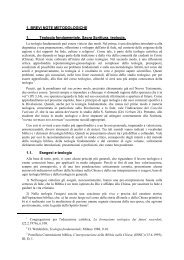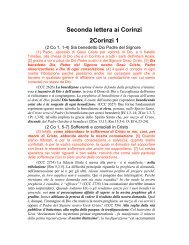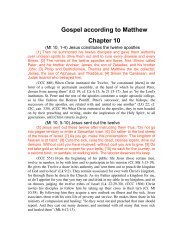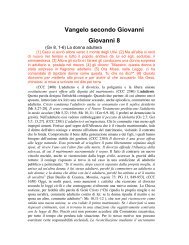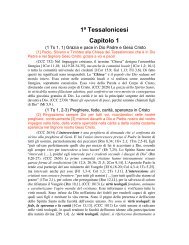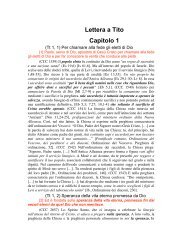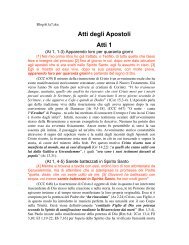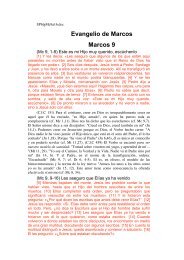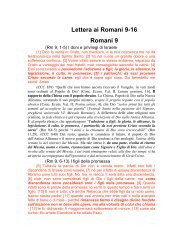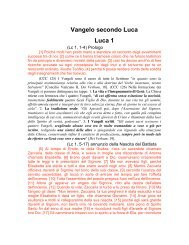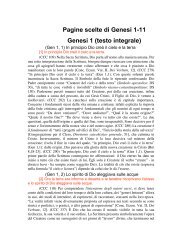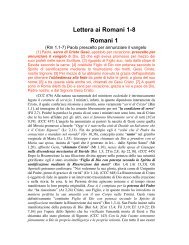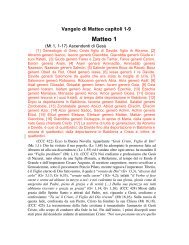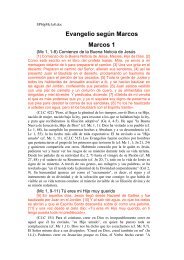Letter to Colossians Colossians 1
Letter to Colossians Colossians 1
Letter to Colossians Colossians 1
- No tags were found...
Create successful ePaper yourself
Turn your PDF publications into a flip-book with our unique Google optimized e-Paper software.
times of abandonment; it opens up his heart in expectation of eternal beatitude.Buoyed up by hope, he is preserved from selfishness and led <strong>to</strong> the happiness thatflows from charity.(Col 1, 9-11) To live in a manner worthy of the Lord[9] Therefore, from the day we heard this, we do not cease prayingfor you and asking that you may be filled with the knowledge of his willthrough all spiritual wisdom and understanding [10] <strong>to</strong> live in a mannerworthy of the Lord, so as <strong>to</strong> be fully pleasing, in every good work bearingfruit and growing in the knowledge of God, [11] strengthened with everypower, in accord with his glorious might, for all endurance and patience,with joy(CCC 2520) Baptism confers on its recipient the grace of purification fromall sins. But the baptized must continue <strong>to</strong> struggle against concupiscence of theflesh and disordered desires. With God's grace he will prevail - by the virtue andgift of chastity, for chastity lets us love with upright and undivided heart; - bypurity of intention which consists in seeking the true end of man: with simplicityof vision, the baptized person seeks <strong>to</strong> find and <strong>to</strong> fulfill God's will in everything(Cf. Rom 12:2; Col 1:10); - by purity of vision, external and internal; bydiscipline of feelings and imagination; by refusing all complicity in impurethoughts that incline us <strong>to</strong> turn aside from the path of God's commandments:"Appearance arouses yearning in fools" (Wis 15:5); - by prayer: I thought thatcontinence arose from one's own powers, which I did not recognize in myself. Iwas foolish enough not <strong>to</strong> know… that no one can be continent unless you grantit. For you would surely have granted it if my inner groaning had reached yourears and I with firm faith had cast my cares on you (St. Augustine, Conf. 6, 11,20: PL 32, 729-730).(Col 1, 12-14) He delivered us from the power of darkness[12] giving thanks <strong>to</strong> the Father, who has made you fit <strong>to</strong> share in theinheritance of the holy ones in light. [13] He delivered us from the power ofdarkness and transferred us <strong>to</strong> the kingdom of his beloved Son, [14] inwhom we have redemption, the forgiveness of sins.(CCC 1250) Born with a fallen human nature and tainted by original sin,children also have need of the new birth in Baptism <strong>to</strong> be freed from the power ofdarkness and brought in<strong>to</strong> the realm of the freedom of the children of God, <strong>to</strong>which all men are called (Cf. Council of Trent (1546): DS 1514; cf. Col 1:12-14).The sheer gratui<strong>to</strong>usness of the grace of salvation is particularly manifest in infantBaptism. The Church and the parents would deny a child the priceless grace ofbecoming a child of God were they not <strong>to</strong> confer Baptism shortly after birth (Cf.CIC, can. 867; CCEO, cann. 681; 686, 1). (CCC 1251) Christian parents willrecognize that this practice also accords with their role as nurturers of the life thatGod has entrusted <strong>to</strong> them (Cf. LG 11; 41; GS 48; CIC, can. 868). (CCC 517)Christ's whole life is a mystery of redemption. Redemption comes <strong>to</strong> us above allthrough the blood of his cross (Cf. Eph 1:7; Col 1:13-14; 2 Pt 1:18-19), but thismystery is at work throughout Christ's entire life: - already in his Incarnationthrough which by becoming poor he enriches us with his poverty (Cf. 2 Cor 8:9);- in his hidden life which by his submission a<strong>to</strong>nes for our disobedience (Cf. Lk2:51); - in his word which purifies its hearers (Cf. Jn 15:3); - in his healings andexorcisms by which "he <strong>to</strong>ok our infirmities and bore our diseases" (Mt 8:17; cf.Isa 53:4); - and in his Resurrection by which he justifies us (Cf. Rom 4:25).
(CCC 427) In catechesis "Christ, the Incarnate Word and Son of God,… istaught - everything else is taught with reference <strong>to</strong> him - and it is Christ alonewho teaches - anyone else teaches <strong>to</strong> the extent that he is Christ's spokesman,enabling Christ <strong>to</strong> teach with his lips…. Every catechist should be able <strong>to</strong> apply <strong>to</strong>himself the mysterious words of Jesus: 'My teaching is not mine, but his who sentme'" (CT 6; cf. Jn 7:16). (CCC 428) Whoever is called "<strong>to</strong> teach Christ" must firstseek "the surpassing worth of knowing Christ Jesus"; he must suffer "the loss ofall things… " in order <strong>to</strong> "gain Christ and be found in him", and "<strong>to</strong> know him andthe power of his resurrection, and [<strong>to</strong>] share his sufferings, becoming like him inhis death, that if possible [he] may attain the resurrection from the dead" (Phil3:8-11). (CCC 429) From this loving knowledge of Christ springs the desire <strong>to</strong>proclaim him, <strong>to</strong> "evangelize", and <strong>to</strong> lead others <strong>to</strong> the "yes" of faith in JesusChrist. But at the same time the need <strong>to</strong> know this faith better makes itself felt. Tothis end, following the order of the Creed, Jesus' principal titles - "Christ", "Sonof God", and "Lord" (article 2) - will be presented. The Creed next confesses thechief mysteries of his life - those of his Incarnation (article 3), Paschal mystery(articles 4 and 5) and glorification (articles 6 and 7).(Col 2, 4-5) No one may deceive you[4] I say this so that no one may deceive you by speciousarguments. [5] For even if I am absent in the flesh, yet I am with you inspirit, rejoicing as I observe your good order and the firmness of your faithin Christ.(CCC 469) The Church thus confesses that Jesus is inseparably true Godand true man. He is truly the Son of God who, without ceasing <strong>to</strong> be God andLord, became a man and our brother: "What he was, he remained and what hewas not, he assumed", sings the Roman Liturgy (LH, 1 January, antiphon forMorning Prayer; cf. St. Leo the Great, Sermo in nat. Dom. 1, 2; PL 54, 191-192)and the liturgy of St. John Chrysos<strong>to</strong>m proclaims and sings: "O only-begottenSon and Word of God, immortal being, you who deigned for our salvation <strong>to</strong>become incarnate of the holy Mother of God and ever-virgin Mary, you whowithout change became man and were crucified, O Christ our God, you who byyour death have crushed death, you who are one of the Holy Trinity, glorifiedwith the Father and the Holy Spirit, save us!" (Liturgy of St. John Chrysos<strong>to</strong>m,Troparion “O monogenes”). (CCC 470) Because "human nature was assumed, notabsorbed" (GS 22 § 2), in the mysterious union of the Incarnation, the Churchwas led over the course of centuries <strong>to</strong> confess the full reality of Christ's humansoul, with its operations of intellect and will, and of his human body. In parallelfashion, she had <strong>to</strong> recall on each occasion that Christ's human nature belongs, ashis own, <strong>to</strong> the divine person of the Son of God, who assumed it. Everything thatChrist is and does in this nature derives from "one of the Trinity". The Son ofGod therefore communicates <strong>to</strong> his humanity his own personal mode of existencein the Trinity. In his soul as in his body, Christ thus expresses humanly the divineways of the Trinity (Cf. Jn 14:9-10): The Son of God … worked with humanhands; he thought with a human mind. He acted with a human will, and with ahuman heart he loved. Born of the Virgin Mary, he has truly been made one of us,like <strong>to</strong> us in all things except sin (GS 22 § 2). (CCC 471) Apollinarius ofLaodicaea asserted that in Christ the divine Word had replaced the soul or spirit.Against this error the Church confessed that the eternal Son also assumed arational, human soul (Cf. Damasus 1: DS 149).
(Col 2, 6-8) You received Christ Jesus the Lord walk in him[6] So, as you received Christ Jesus the Lord, walk in him, [7] rootedin him and built upon him and established in the faith as you were taught,abounding in thanksgiving. [8] See <strong>to</strong> it that no one captivate you with anempty, seductive philosophy according <strong>to</strong> human tradition, according <strong>to</strong>the elemental powers of the world and not according <strong>to</strong> Christ.(CCC 1794) A good and pure conscience is enlightened by true faith, forcharity proceeds at the same time "from a pure heart and a good conscience andsincere faith" (1 Tim 5; cf. 3:9; 2 Tim 3; 1 Pet 3:21; Acts 24:16). The more acorrect conscience prevails, the more do persons and groups turn aside from blindchoice and try <strong>to</strong> be guided by objective standards of moral conduct (GS 16). (CCC1792) Ignorance of Christ and his Gospel, bad example given by others,enslavement <strong>to</strong> one's passions, assertion of a mistaken notion of au<strong>to</strong>nomy ofconscience, rejection of the Church's authority and her teaching, lack of conversionand of charity: these can be at the source of errors of judgment in moral conduct.(Col 2, 9-10) In him dwells the whole fullness of the deity[9] For in him dwells the whole fullness of the deity bodily, [10] andyou share in this fullness in him, who is the head of every principality andpower.(CCC 463) Belief in the true Incarnation of the Son of God is the distinctivesign of Christian faith: "By this you know the Spirit of God: every spirit whichconfesses that Jesus Christ has come in the flesh is of God" (1 Jn 4:2). Such is thejoyous conviction of the Church from her beginning whenever she sings "themystery of our religion": "He was manifested in the flesh" (1 Tim 3:16). (CCC464) The unique and al<strong>to</strong>gether singular event of the Incarnation of the Son ofGod does not mean that Jesus Christ is part God and part man, nor does it implythat he is the result of a confused mixture of the divine and the human. Hebecame truly man while remaining truly God. Jesus Christ is true God and trueman. During the first centuries, the Church had <strong>to</strong> defend and clarify this truth offaith against the heresies that falsified it. (CCC 479) At the time appointed byGod, the only Son of the Father, the eternal Word, that is, the Word andsubstantial Image of the Father, became incarnate; without losing his divinenature he has assumed human nature. (CCC 480) Jesus Christ is true God and trueman, in the unity of his divine person; for this reason he is the one and onlymedia<strong>to</strong>r between God and men. (CCC 481) Jesus Christ possesses two natures,one divine and the other human, not confused, but united in the one person ofGod's Son. (CCC 482) Christ, being true God and true man, has a human intellectand will, perfectly attuned and subject <strong>to</strong> his divine intellect and divine will,which he has in common with the Father and the Holy Spirit. (CCC 483) TheIncarnation is therefore the mystery of the wonderful union of the divine andhuman natures in the one person of the Word.(Col 2, 11) In him you were also circumcised[11] In him you were also circumcised with a circumcision notadministered by hand, by stripping off the carnal body, with thecircumcision of Christ.(CCC 527) Jesus' circumcision, on the eighth day after his birth (Cf. Lk2:21), is the sign of his incorporation in<strong>to</strong> Abraham's descendants, in<strong>to</strong> the peopleof the covenant. It is the sign of his submission <strong>to</strong> the Law (Cf. Gal 4:4) and his
deputation <strong>to</strong> Israel's worship, in which he will participate throughout his life.This sign prefigures that "circumcision of Christ" which is Baptism (Cf. Col 2:11-13). (CCC 628) Baptism, the original and full sign of which is immersion,efficaciously signifies the descent in<strong>to</strong> the <strong>to</strong>mb by the Christian who dies <strong>to</strong> sinwith Christ in order <strong>to</strong> live a new life. "We were buried therefore with him bybaptism in<strong>to</strong> death, so that as Christ was raised from the dead by the glory of theFather, we <strong>to</strong>o might walk in newness of life" (Rom 6:4; cf. Col 2:12; Eph 5:26).(Col 2, 12-14) You were buried with him in baptism[12] You were buried with him in baptism, in which you were alsoraised with him through faith in the power of God, who raised him from thedead. [13] And even when you were dead (in) transgressions and theuncircumcision of your flesh, he brought you <strong>to</strong> life along with him, havingforgiven us all our transgressions; [14] obliterating the bond against us,with its legal claims, which was opposed <strong>to</strong> us, he also removed it fromour midst, nailing it <strong>to</strong> the cross;(CCC 1002) Christ will raise us up "on the last day"; but it is also true that,in a certain way, we have already risen with Christ. For, by virtue of the HolySpirit, Christian life is already now on earth a participation in the death andResurrection of Christ: And you were buried with him in Baptism, in which youwere also raised with him through faith in the working of God, who raised himfrom the dead…. If then you have been raised with Christ, seek the things that areabove, where Christ is, seated at the right hand of God (Col 2:12; 3:1). (CCC1214) This sacrament is called Baptism, after the central rite by which it is carriedout: <strong>to</strong> baptize (Greek baptizein) means <strong>to</strong> "plunge" or "immerse"; the "plunge"in<strong>to</strong> the water symbolizes the catechumen's burial in<strong>to</strong> Christ's death, from whichhe rises up by resurrection with him, as "a new creature" (2 Cor 5:17; Gal 6:15;Cf. Rom 6:34; Col 2:12). (CCC 1227) According <strong>to</strong> the Apostle Paul, the believerenters through Baptism in<strong>to</strong> communion with Christ's death, is buried with him,and rises with him: Do you not know that all of us who have been baptized in<strong>to</strong>Christ Jesus were baptized in<strong>to</strong> his death? We were buried therefore with him bybaptism in<strong>to</strong> death, so that as Christ was raised from the dead by the glory of theFather, we <strong>to</strong>o might walk in newness of life (Rom 6:3-4; cf. Col 2:12). Thebaptized have "put on Christ" (Gal 3:27). Through the Holy Spirit, Baptism is abath that purifies, justifies, and sanctifies (Cf. 1 Cor 6:11; 12:13). (CCC 1694)Incorporated in<strong>to</strong> Christ by Baptism, Christians are "dead <strong>to</strong> sin and alive <strong>to</strong> Godin Christ Jesus" and so participate in the life of the Risen Lord (Rom 6:11 and cf.6:5; cf. Col 2:12). Following Christ and united with him (Cf. Jn 15:5), Christianscan strive <strong>to</strong> be "imita<strong>to</strong>rs of God as beloved children, and walk in love" (Eph5:1-2) by conforming their thoughts, words and actions <strong>to</strong> the "mind… which isyours in Christ Jesus" (Phil 2:5), and by following his example (Cf. Jn 13:12-16).(Col 2, 15-17) The reality belongs <strong>to</strong> Christ[15] despoiling the principalities and the powers, he made a publicspectacle of them, leading them away in triumph by it. [16] Let no one,then, pass judgment on you in matters of food and drink or with regard <strong>to</strong>a festival or new moon or sabbath. [17] These are shadows of things <strong>to</strong>come; the reality belongs <strong>to</strong> Christ.(CCC 2111) Superstition is the deviation of religious feeling and of thepractices this feeling imposes. It can even affect the worship we offer the trueGod, e.g., when one attributes an importance in some way magical <strong>to</strong> certain
practices otherwise lawful or necessary. To attribute the efficacy of prayers or ofsacramental signs <strong>to</strong> their mere external performance, apart from the interiordispositions that they demand, is <strong>to</strong> fall in<strong>to</strong> superstition (Cf. Mt 23:16-22). (CCC2138) Superstition is a departure from the worship that we give <strong>to</strong> the true God. Itis manifested in idolatry, as well as in various forms of divination and magic.(CCC 2110) The first commandment forbids honoring gods other than the oneLord who has revealed himself <strong>to</strong> his people. It proscribes superstition andirreligion. Superstition in some sense represents a perverse excess of religion;irreligion is the vice contrary by defect <strong>to</strong> the virtue of religion.(Col 2, 18-19) Let no one disqualify you[18] Let no one disqualify you, delighting in self-abasement andworship of angels, taking his stand on visions, inflated without reason byhis fleshly mind, [19] and not holding closely <strong>to</strong> the head, from whom thewhole body, supported and held <strong>to</strong>gether by its ligaments and bonds,achieves the growth that comes from God.(CCC 792) Christ "is the head of the body, the Church" (Col 1:18). He isthe principle of creation and redemption. Raised <strong>to</strong> the Father's glory, "ineverything he [is] preeminent" (Col 1:18), especially in the Church, throughwhom he extends his reign over all things. (CCC 793) Christ unites us with hisPassover: all his members must strive <strong>to</strong> resemble him, "until Christ be formed"in them (Gal 4:19). "For this reason we… are taken up in<strong>to</strong> the mysteries of hislife, . . . associated with his sufferings as the body with its head, suffering withhim, that with him we may be glorified" (LG 7 § 4; cf. Phil 3:21; Rom 8:17).(CCC 794) Christ provides for our growth: <strong>to</strong> make us grow <strong>to</strong>ward him, ourhead (Cf. Col 2:19; Eph 4:11-16), he provides in his Body, the Church, the giftsand assistance by which we help one another along the way of salvation.(Col 2, 20-23) You died with Christ[20] If you died with Christ <strong>to</strong> the elemental powers of the world, whydo you submit <strong>to</strong> regulations as if you were still living in the world? [21]"Do not handle! Do not taste! Do not <strong>to</strong>uch!" [22] These are all thingsdestined <strong>to</strong> perish with use; they accord with human precepts andteachings. [23] While they have a semblance of wisdom in rigor ofdevotion and self-abasement (and) severity <strong>to</strong> the body, they are of novalue against gratification of the flesh.(CCC 578) Jesus, Israel's Messiah and therefore the greatest in the kingdomof heaven, was <strong>to</strong> fulfil the Law by keeping it in its all embracing detail -according <strong>to</strong> his own words, down <strong>to</strong> "the least of these commandments" (Mt5:19). He is in fact the only one who could keep it perfectly (Cf. Jn 8:46). Ontheir own admission the Jews were never able <strong>to</strong> observe the Law in its entiretywithout violating the least of its precepts (Cf. Jn 7:19; Acts 13:38-41; 15:10). Thisis why every year on the Day of A<strong>to</strong>nement the children of Israel ask God'sforgiveness for their transgressions of the Law. The Law indeed makes up oneinseparable whole, and St. James recalls, "Whoever keeps the whole law but failsin one point has become guilty of all of it”. (Jas 2:10; cf. Gal 3:10; 5:3). (CCC579) This principle of integral observance of the Law not only in letter but inspirit was dear <strong>to</strong> the Pharisees. By giving Israel this principle they had led manyJews of Jesus' time <strong>to</strong> an extreme religious zeal (Cf. Rom 10:2). This zeal, were itnot <strong>to</strong> lapse in<strong>to</strong> "hypocritical" casuistry (Cf. Mt 15:31; Lk 11:39-54), could onlyprepare the People for the unprecedented intervention of God through the perfect
many kinds of sins. Scripture provides several lists of them. The <strong>Letter</strong> <strong>to</strong> theGalatians contrasts the works of the flesh with the fruit of the Spirit: "Now theworks of the flesh are plain: fornication, impurity, licentiousness, idolatry,sorcery, enmity, strife, jealousy, anger, selfishness, dissension, factions, envy,drunkenness, carousing, and the like. I warn you, as I warned you before, thatthose who do such things shall not inherit the Kingdom of God" (Gal 5:19-21; cf.Rom 1:28-32; 1 Cor 9-10; Eph 5:3-5; Col 3:5-8; 1 Tim 9-10; 2 Tim 2-5). (CCC1972) The New Law is called a law of love because it makes us act out of the loveinfused by the Holy Spirit, rather than from fear; a law of grace, because itconfers the strength of grace <strong>to</strong> act, by means of faith and the sacraments; a law offreedom, because it sets us free from the ritual and juridical observances of theOld Law, inclines us <strong>to</strong> act spontaneously by the prompting of charity and,finally, lets us pass from the condition of a servant who "does not know what hismaster is doing" <strong>to</strong> that of a friend of Christ - "For all that I have heard from myFather I have made known <strong>to</strong> you" - or even <strong>to</strong> the status of son and heir (Jn15:15; cf. Jas 1:25; 2:12; Gal 4:1-7. 21-31; Rom 8:15).(Col 3, 11-13) Christ is all and in all[11] Here there is not Greek and Jew, circumcision anduncircumcision, barbarian, Scythian, slave, free; but Christ is all and in all.[12] Put on then, as God's chosen ones, holy and beloved, heartfeltcompassion, kindness, humility, gentleness, and patience, [13] bearingwith one another and forgiving one another, if one has a grievance againstanother; as the Lord has forgiven you, so must you also do.(CCC 2809) The holiness of God is the inaccessible center of his eternalmystery. What is revealed of it in creation and his<strong>to</strong>ry, Scripture calls "glory," theradiance of his majesty (Cf. Ps 8; Isa 6:3). In making man in his image andlikeness, God "crowned him with glory and honor," but by sinning, man fell"short of the glory of God" (Ps 8:5; Rom 3:23; cf. Gen 1:26). From that time on,God was <strong>to</strong> manifest his holiness by revealing and giving his name, in order <strong>to</strong>res<strong>to</strong>re man <strong>to</strong> the image of his Crea<strong>to</strong>r (Col 3:10). (CCC 1971) To the Lord'sSermon on the Mount it is fitting <strong>to</strong> add the moral catechesis of the apos<strong>to</strong>licteachings, such as Romans 12-15, 1 Corinthians 12-13, <strong>Colossians</strong> 3-4,Ephesians 4-5, etc. This doctrine hands on the Lord's teaching with the authorityof the apostles, particularly in the presentation of the virtues that flow from faithin Christ and are animated by charity, the principal gift of the Holy Spirit. "Letcharity be genuine.... Love one another with brotherly affection.... Rejoice in yourhope, be patient in tribulation, be constant in prayer. Contribute <strong>to</strong> the needs ofthe saints, practice hospitality" (Rom 12:9-13). This catechesis also teaches us <strong>to</strong>deal with cases of conscience in the light of our relationship <strong>to</strong> Christ and <strong>to</strong> theChurch (Cf. Rom 14; 1 Cor 5-10). (CCC 2518) The sixth beatitude proclaims,"Blessed are the pure in heart, for they shall see God" (Mt 5:8). "Pure in heart"refers <strong>to</strong> those who have attuned their intellects and wills <strong>to</strong> the demands of God'sholiness, chiefly in three areas: charity (Cf. 1 Tim 4:3-9; 2 Tim 2:22); chastity orsexual rectitude (Cf. 1 Thess 4:7; Col 3:5; Eph 4:19); love of truth and orthodoxyof faith (Cf. Titus 1:15; 1 Tim 1:3-4; 2 Tim 2:23-26). There is a connectionbetween purity of heart, of body, and of faith: The faithful must believe thearticles of the Creed "so that by believing they may obey God, by obeying maylive well, by living well may purify their hearts, and with pure hearts may
understand what they believe" (St. Augustine, De fide et symbolo 10, 25: PL 40,196).(Col 3, 14) Love that is the bond of perfection[14] And over all these put on love, that is, the bond of perfection.(CCC 1844 By charity, we love God above all things and our neighbor asourselves for love of God. Charity, the form of all the virtues, "binds everything<strong>to</strong>gether in perfect harmony" (Col 3:14). (CCC 815) What are these bonds ofunity? Above all, charity "binds everything <strong>to</strong>gether in perfect harmony" (Col3:14). But the unity of the pilgrim Church is also assured by visible bonds ofcommunion: - profession of one faith received from the Apostles; - commoncelebration of divine worship, especially of the sacraments; - apos<strong>to</strong>lic successionthrough the sacrament of Holy Orders, maintaining the fraternal concord of God'sfamily (Cf. UR 2; LG 14; CIC, can. 205). (CCC 1827) The practice of all thevirtues is animated and inspired by charity, which "binds everything <strong>to</strong>gether inperfect harmony" (Col 3:14); it is the form of the virtues; it articulates and ordersthem among themselves; it is the source and the goal of their Christian practice.Charity upholds and purifies our human ability <strong>to</strong> love, and raises it <strong>to</strong> thesupernatural perfection of divine love. (CCC 2633) When we share in God'ssaving love, we understand that every need can become the object of petition.Christ, who assumed all things in order <strong>to</strong> redeem all things, is glorified by whatwe ask the Father in his name (Cf. Jn 14:13). It is with this confidence that St.James and St. Paul exhort us <strong>to</strong> pray at all times (Cf. Jas 1:5-8; Eph 5:20; Phil4:6-7; Col 3:16-17; 1 Thess 5:17-18).(Col 3, 15) Let the peace of Christ control your hearts[15] And let the peace of Christ control your hearts, the peace in<strong>to</strong>which you were also called in one body. And be thankful.(CCC 1360) The Eucharist is a sacrifice of thanksgiving <strong>to</strong> the Father, ablessing by which the Church expresses her gratitude <strong>to</strong> God for all his benefits,for all that he has accomplished through creation, redemption, and sanctification.Eucharist means first of all "thanksgiving." (CCC 1359) The Eucharist, thesacrament of our salvation accomplished by Christ on the cross, is also a sacrificeof praise in thanksgiving for the work of creation. In the Eucharistic sacrifice thewhole of creation loved by God is presented <strong>to</strong> the Father through the death andthe Resurrection of Christ. Through Christ the Church can offer the sacrifice ofpraise in thanksgiving for all that God has made good, beautiful, and just increation and in humanity. (CCC 1361) The Eucharist is also the sacrifice of praiseby which the Church sings the glory of God in the name of all creation. Thissacrifice of praise is possible only through Christ: he unites the faithful <strong>to</strong> hisperson, <strong>to</strong> his praise, and <strong>to</strong> his intercession, so that the sacrifice of praise <strong>to</strong> theFather is offered through Christ and with him, <strong>to</strong> be accepted in him. (CCC 2796)When the Church prays "our Father who art in heaven," she is professing that weare the People of God, already seated "with him in the heavenly places in ChristJesus" and "hidden with Christ in God" (Eph 2:6; Col 3:3); yet at the same time,"here indeed we groan, and long <strong>to</strong> put on our heavenly dwelling" (2 Cor 5:2; cf.Phil 3:20; Heb 13:14). [Christians] are in the flesh, but do not live according <strong>to</strong>the flesh. They spend their lives on earth, but are citizens of heaven (AdDiognetum 5: PG 2, 1173). (CCC 2097) To adore God is <strong>to</strong> acknowledge, inrespect and absolute submission, the "nothingness of the creature" who would notexist but for God. To adore God is <strong>to</strong> praise and exalt him and <strong>to</strong> humble oneself,
as Mary did in the Magnificat, confessing with gratitude that he has done greatthings and holy is his name (cf. Lk 1:46-49). The worship of the one God setsman free from turning in on himself, from the slavery of sin and the idolatry ofthe world.(Col 3, 16-17) Do everything in the name of the Lord Jesus[16] Let the word of Christ dwell in you richly, as in all wisdom youteach and admonish one another, singing psalms, hymns, and spiritualsongs with gratitude in your hearts <strong>to</strong> God. [17] And whatever you do, inword or in deed, do everything in the name of the Lord Jesus, givingthanks <strong>to</strong> God the Father through him.(CCC 2641) "[Address] one another in psalms and hymns and spiritualsongs, singing and making melody <strong>to</strong> the Lord with all your heart" (Eph 5:19; Col3:16). Like the inspired writers of the New Testament, the first Christiancommunities read the Book of Psalms in a new way, singing in it the mystery ofChrist. In the newness of the Spirit, they also composed hymns and canticles inthe light of the unheard-of event that God accomplished in his Son: hisIncarnation, his death which conquered death, his Resurrection, and Ascension <strong>to</strong>the right hand of the Father (Cf. Phil 2:6-11; Col 1:15-20; Eph 5:14; 1 Tim 3:16;6:15-16; 2 Tim 2:11-13). Doxology, the praise of God, arises from this"marvelous work" of the whole economy of salvation (Cf. Eph 1:3-14; Rom16:25-27; Eph 3:20-21; Jude 24-25). (CCC 1156) "The musical tradition of theuniversal Church is a treasure of inestimable value, greater even than that of anyother art. The main reason for this pre-eminence is that, as a combination ofsacred music and words, it forms a necessary or integral part of solemn liturgy"(SC 112). The composition and singing of inspired psalms, often accompanied bymusical instruments, were already closely linked <strong>to</strong> the liturgical celebrations ofthe Old Covenant. The Church continues and develops this tradition: "Address …one another in psalms and hymns and spiritual songs, singing and making melody<strong>to</strong> the Lord with all your heart." "He who sings prays twice" (Eph 5:19; St.Augustine, En. in Ps. 72,1: PL 36, 914; cf. Col 3:16). (CCC 1157) Song andmusic fulfill their function as signs in a manner all the more significant when theyare "more closely connected… with the liturgical action" (SC 112 § 3), according<strong>to</strong> three principal criteria: beauty expressive of prayer, the unanimousparticipation of the assembly at the designated moments, and the solemncharacter of the celebration. In this way they participate in the purpose of theliturgical words and actions: the glory of God and the sanctification of the faithful(Cf. SC 112): How I wept, deeply moved by your hymns, songs, and the voicesthat echoed through your Church! What emotion I experienced in them! Thosesounds flowed in<strong>to</strong> my ears distilling the truth in my heart. A feeling of devotionsurged within me, and tears streamed down my face - tears that did me good (St.Augustine, Conf. 9, 6, 14: PL 32, 769-770).(Col 3, 18-19) Husbands love your wives[18] Wives, be subordinate <strong>to</strong> your husbands, as is proper in theLord. [19] Husbands, love your wives, and avoid any bitterness <strong>to</strong>wardthem.(CCC 2203) In creating man and woman, God instituted the human familyand endowed it with its fundamental constitution. Its members are persons equalin dignity. For the common good of its members and of society, the familynecessarily has manifold responsibilities, rights, and duties. (CCC 2204) "The
Christian family constitutes a specific revelation and realization of ecclesialcommunion, and for this reason it can and should be called a domestic church"(Familiaris consortio, 21; cf. Lumen gentium, 11). It is a community of faith,hope, and charity; it assumes singular importance in the Church, as is evident inthe New Testament (Cf. Eph 5:21b: 4; Col 3:18-21; 1Pet 3:1-7). (CCC 2205) TheChristian family is a communion of persons, a sign and image of the communionof the Father and the Son in the Holy Spirit. In the procreation and education ofchildren it reflects the Father's work of creation. It is called <strong>to</strong> partake of theprayer and sacrifice of Christ. Daily prayer and the reading of the Word of Godstrengthen it in charity. The Christian family has an evangelizing and missionarytask. (CCC 2206) The relationships within the family bring an affinity of feelings,affections and interests, arising above all from the members' respect for oneanother. The family is a privileged community called <strong>to</strong> achieve a "sharing ofthought and common deliberation by the spouses as well as their eagercooperation as parents in the children's upbringing" (GS 52 § 1).(Col 3, 20) Children obey your parents in everything[20] Children, obey your parents in everything, for this is pleasing <strong>to</strong>the Lord.(CCC 2215) Respect for parents (filial piety) derives from gratitude <strong>to</strong>wardthose who, by the gift of life, their love and their work, have brought theirchildren in<strong>to</strong> the world and enabled them <strong>to</strong> grow in stature, wisdom, and grace."With all your heart honor your father, and do not forget the birth pangs of yourmother. Remember that through your parents you were born; what can you giveback <strong>to</strong> them that equals their gift <strong>to</strong> you?" (Sir 7:27-28). (CCC 2216) Filialrespect is shown by true docility and obedience. "My son, keep your father'scommandment, and forsake not your mother's teaching.... When you walk, theywill lead you; when you lie down, they will watch over you; and when youawake, they will talk with you" (Prov 6:20-22). "A wise son hears his father'sinstruction, but a scoffer does not listen <strong>to</strong> rebuke" (Prov 13:1). (CCC 2217) Aslong as a child lives at home with his parents, the child should obey his parents inall that they ask of him when it is for his good or that of the family. "Children,obey your parents in everything, for this pleases the Lord" (Col 3:20; cf. Eph 6:1).Children should also obey the reasonable directions of their teachers and all <strong>to</strong>whom their parents have entrusted them. But if a child is convinced in consciencethat it would be morally wrong <strong>to</strong> obey a particular order, he must not do so. Asthey grow up, children should continue <strong>to</strong> respect their parents. They shouldanticipate their wishes, willingly seek their advice, and accept their justadmonitions. Obedience <strong>to</strong>ward parents ceases with the emancipation of thechildren; not so respect, which is always owed <strong>to</strong> them. This respect has its rootsin the fear of God, one of the gifts of the Holy Spirit. (CCC 2218) The fourthcommandment reminds grown children of their responsibilities <strong>to</strong>ward theirparents. As much as they can, they must give them material and moral support inold age and in times of illness, loneliness, or distress. Jesus recalls this duty ofgratitude (Cf. Mk 7:10-12). For the Lord honored the father above the children,and he confirmed the right of the mother over her sons. Whoever honors hisfather a<strong>to</strong>nes for sins, and whoever glorifies his mother is like one who lays uptreasure. Whoever honors his father will be gladdened by his own children, andwhen he prays he will be heard. Whoever glorifies his father will have long life,and whoever obeys the Lord will refresh his mother (Sir 3:2-6). O son, help your
father in his old age, and do not grieve him as long as he lives; even if he islacking in understanding, show forbearance; in all your strength do not despisehim.... Whoever forsakes his father is like a blasphemer, and whoever angers hismother is cursed by the Lord (Sir 3:12-13, 16).(Col 3, 21) Fathers do not provoke your children[21] Fathers, do not provoke your children, so they may not becomediscouraged.(CCC 2223) Parents have the first responsibility for the education of theirchildren. They bear witness <strong>to</strong> this responsibility first by creating a home wheretenderness, forgiveness, respect, fidelity, and disinterested service are the rule.The home is well suited for education in the virtues. This requires anapprenticeship in self-denial, sound judgment, and self-mastery - thepreconditions of all true freedom. Parents should teach their children <strong>to</strong>subordinate the "material and instinctual dimensions <strong>to</strong> interior and spiritual ones"(CA 36 § 2). Parents have a grave responsibility <strong>to</strong> give good example <strong>to</strong> theirchildren. By knowing how <strong>to</strong> acknowledge their own failings <strong>to</strong> their children,parents will be better able <strong>to</strong> guide and correct them: He who loves his son willnot spare the rod.... He who disciplines his son will profit by him (Sir 30:1-2).Fathers, do not provoke your children <strong>to</strong> anger, but bring them up in the disciplineand instruction of the Lord (Eph 6:4). (CCC 2224) The home is the naturalenvironment for initiating a human being in<strong>to</strong> solidarity and communalresponsibilities. Parents should teach children <strong>to</strong> avoid the compromising anddegrading influences which threaten human societies. (CCC 2225) Through thegrace of the sacrament of marriage, parents receive the responsibility andprivilege of evangelizing their children. Parents should initiate their children at anearly age in<strong>to</strong> the mysteries of the faith of which they are the "first heralds" fortheir children. They should associate them from their tenderest years with the lifeof the Church (LG 11 § 2). A wholesome family life can foster interiordispositions that are a genuine preparation for a living faith and remain a supportfor it throughout one's life. (CCC 2226) Education in the faith by the parentsshould begin in the child's earliest years. This already happens when familymembers help one another <strong>to</strong> grow in faith by the witness of a Christian life inkeeping with the Gospel. Family catechesis precedes, accompanies, and enrichesother forms of instruction in the faith. Parents have the mission of teaching theirchildren <strong>to</strong> pray and <strong>to</strong> discover their vocation as children of God (Cf. LG 11).The parish is the Eucharistic community and the heart of the liturgical life ofChristian families; it is a privileged place for the catechesis of children andparents.(Col 3, 22-25) Whatever you do, do from the heart[22] Slaves, obey your human masters in everything, not only whenbeing watched, as currying favor, but in simplicity of heart, fearing theLord. [23] Whatever you do, do from the heart, as for the Lord and not forothers, [24] knowing that you will receive from the Lord the due paymen<strong>to</strong>f the inheritance; be slaves of the Lord Christ. [25] For the wrongdoer willreceive recompense for the wrong he committed, and there is no partiality.(CCC 1929) Social justice can be obtained only in respecting thetranscendent dignity of man. The person represents the ultimate end of society,which is ordered <strong>to</strong> him: What is at stake is the dignity of the human person,whose defense and promotion have been entrusted <strong>to</strong> us by the Crea<strong>to</strong>r, and <strong>to</strong>
whom the men and women at every moment of his<strong>to</strong>ry are strictly andresponsibly in debt (John Paul II, SRS 47). (CCC 1930) Respect for the humanperson entails respect for the rights that flow from his dignity as a creature. Theserights are prior <strong>to</strong> society and must be recognized by it. They are the basis of themoral legitimacy of every authority: by flouting them, or refusing <strong>to</strong> recognizethem in its positive legislation, a society undermines its own moral legitimacy(Cf. John XXIII, PT 65). If it does not respect them, authority can rely only onforce or violence <strong>to</strong> obtain obedience from its subjects. It is the Church's role <strong>to</strong>remind men of good will of these rights and <strong>to</strong> distinguish them from unwarrantedor false claims. (CCC 1931) Respect for the human person proceeds by way ofrespect for the principle that "everyone should look upon his neighbor (withoutany exception) as 'another self,' above all bearing in mind his life and the meansnecessary for living it with dignity" (GS 27 § 1). No legislation could by itself doaway with the fears, prejudices, and attitudes of pride and selfishness whichobstruct the establishment of truly fraternal societies. Such behavior will ceaseonly through the charity that finds in every man a "neighbor," a brother. (CCC2235) Those who exercise authority should do so as a service. "Whoever wouldbe great among you must be your servant" (Mt 20:26). The exercise of authorityis measured morally in terms of its divine origin, its reasonable nature and itsspecific object. No one can command or establish what is contrary <strong>to</strong> the dignityof persons and the natural law.<strong>Colossians</strong> 4(Col 4, 1) You <strong>to</strong>o have a Master in heaven[1] Masters, treat your slaves justly and fairly, realizing that you <strong>to</strong>ohave a Master in heaven.(CCC 1807) Justice is the moral virtue that consists in the constant and firmwill <strong>to</strong> give their due <strong>to</strong> God and neighbor. Justice <strong>to</strong>ward God is called the"virtue of religion." Justice <strong>to</strong>ward men disposes one <strong>to</strong> respect the rights of eachand <strong>to</strong> establish in human relationships the harmony that promotes equity withregard <strong>to</strong> persons and <strong>to</strong> the common good. The just man, often mentioned in theSacred Scriptures, is distinguished by habitual right thinking and the uprightnessof his conduct <strong>to</strong>ward his neighbor. "You shall not be partial <strong>to</strong> the poor or defer<strong>to</strong> the great, but in righteousness shall you judge your neighbor" (Lev 19:15)."Masters, treat your slaves justly and fairly, knowing that you also have a Masterin heaven" (Col 4:1).(Col 4, 2-4) Persevere in prayer, being watchful in it[2] Persevere in prayer, being watchful in it with thanksgiving; [3] atthe same time, pray for us, <strong>to</strong>o, that God may open a door <strong>to</strong> us for theword, <strong>to</strong> speak of the mystery of Christ, for which I am in prison, [4] that Imay make it clear, as I must speak.(CCC 2638) As in the prayer of petition, every event and need can becomean offering of thanksgiving. The letters of St. Paul often begin and end withthanksgiving, and the Lord Jesus is always present in it: "Give thanks in allcircumstances; for this is the will of God in Christ Jesus for you"; "Continuesteadfastly in prayer, being watchful in it with thanksgiving" (1 Thess 5:18; Col4:2). (CCC 2636) The first Christian communities lived this form of fellowshipintensely (Cf. Acts 12:5; 20:36; 21:5; 2 Cor 9:14). Thus the Apostle Paul gives
them a share in his ministry of preaching the Gospel (Cf. Eph 6:18-20; Col 4:3-4;1 Thess 5:25) but also intercedes for them (Cf. 2 Thess 1:11; Col 1:3; Phil 1:3-4).The intercession of Christians recognizes no boundaries: "for all men, for kingsand all who are in high positions," for persecu<strong>to</strong>rs, for the salvation of those whoreject the Gospel (2 Tim 2:1; cf. Rom 12:14; 10:1). (CCC 2849) Such a battle andsuch a vic<strong>to</strong>ry become possible only through prayer. It is by his prayer that Jesusvanquishes the tempter, both at the outset of his public mission and in the ultimatestruggle of his agony (Cf. Mt 4:1-11; 26:36-44). In this petition <strong>to</strong> our heavenlyFather, Christ unites us <strong>to</strong> his battle and his agony. He urges us <strong>to</strong> vigilance of theheart in communion with his own. Vigilance is "cus<strong>to</strong>dy of the heart," and Jesusprayed for us <strong>to</strong> the Father: "Keep them in your name" (Jn 17:11; Cf. Mk 13:9,23, 33-37; 14:38; Lk 12:35-40). The Holy Spirit constantly seeks <strong>to</strong> awaken us <strong>to</strong>keep watch (Cf. 1 Cor 16:13; Col 4:2; 1 Thess 5:6; 1 Pet 5:8). Finally, thispetition takes on all its dramatic meaning in relation <strong>to</strong> the last temptation of ourearthly battle; it asks for final perseverance. "Lo, I am coming like a thief!Blessed is he who is awake" (Rev 16:15).(Col 4, 5-6) Let your speech always be gracious[5] Conduct yourselves wisely <strong>to</strong>ward outsiders, making the most ofthe opportunity. [6] Let your speech always be gracious, seasoned withsalt, so that you know how you should respond <strong>to</strong> each one.(CCC 2500) The practice of goodness is accompanied by spontaneousspiritual joy and moral beauty. Likewise, truth carries with it the joy and splendorof spiritual beauty. Truth is beautiful in itself. Truth in words, the rationalexpression of the knowledge of created and uncreated reality, is necessary <strong>to</strong> man,who is endowed with intellect. But truth can also find other complementary formsof human expression, above all when it is a matter of evoking what is beyondwords: the depths of the human heart, the exaltations of the soul, the mystery ofGod. Even before revealing himself <strong>to</strong> man in words of truth, God reveals himself<strong>to</strong> him through the universal language of creation, the work of his Word, of hiswisdom: the order and harmony of the cosmos - which both the child and thescientist discover - "from the greatness and beauty of created things comes acorresponding perception of their Crea<strong>to</strong>r," "for the author of beauty createdthem" (Wis 13:3, 5). [Wisdom] is a breath of the power of God, and a pureemanation of the glory of the Almighty; therefore nothing defiled gains entrancein<strong>to</strong> her. For she is a reflection of eternal light, a spotless mirror of the working ofGod, and an image of his goodness (Wis 7:25-26). For [wisdom] is more beautifulthan the sun, and excels every constellation of the stars. Compared with the lightshe is found <strong>to</strong> be superior, for it is succeeded by the night, but against wisdomevil does not prevail (Wis 7:29-30). I became enamored of her beauty (Wis 8:2).(Col 4, 7-14) That you may be perfect[7] Tychicus, my beloved brother, trustworthy minister, and fellowslave in the Lord, will tell you all the news of me. [8] I am sending him <strong>to</strong>you for this very purpose, so that you may know about us and that he mayencourage your hearts, [9] <strong>to</strong>gether with Onesimus, a trustworthy andbeloved brother, who is one of you. They will tell you about everythinghere. [10] Aristarchus, my fellow prisoner, sends you greetings, as doesMark the cousin of Barnabas (concerning whom you have receivedinstructions; if he comes <strong>to</strong> you, receive him), [11] and Jesus, who iscalled Justus, who are of the circumcision; these alone are my co-workers
for the kingdom of God, and they have been a comfort <strong>to</strong> me. [12]Epaphras sends you greetings; he is one of you, a slave of Christ (Jesus),always striving for you in his prayers so that you may be perfect and fullyassured in all the will of God. [13] For I can testify that he works very hardfor you and for those in Laodicea and those in Hierapolis. [14] Luke thebeloved physician sends greetings, as does Demas.(CCC 2822) Our Father "desires all men <strong>to</strong> be saved and <strong>to</strong> come <strong>to</strong> theknowledge of the truth" (1 Tim 2:3-4). He "is forbearing <strong>to</strong>ward you, not wishingthat any should perish" (2 Pet 3:9; cf. Mt 18:14). His commandment is "that youlove one another; even as I have loved you, that you also love one another" (Jn13:34; cf. 1 Jn 3; 4; Lk 10:25-37). This commandment summarizes all the othersand expresses his entire will. (CCC 2823) "He has made known <strong>to</strong> us the mysteryof his will, according <strong>to</strong> his good pleasure that he set forth in Christ… <strong>to</strong> gatherup all things in him, things in heaven and things on earth. In Christ we have alsoobtained an inheritance, having been destined according <strong>to</strong> the purpose of himwho accomplishes all things according <strong>to</strong> his counsel and will" (Eph 1:9-11). Weask insistently for this loving plan <strong>to</strong> be fully realized on earth as it is already inheaven. (CCC 2824) In Christ, and through his human will, the will of the Fatherhas been perfectly fulfilled once for all. Jesus said on entering in<strong>to</strong> this world:"Lo, I have come <strong>to</strong> do your will, O God" (Heb 10:7; Ps 40:7). Only Jesus cansay: "I always do what is pleasing <strong>to</strong> him" (Jn 8:29). In the prayer of his agony, heconsents <strong>to</strong>tally <strong>to</strong> this will: "not my will, but yours be done" (Lk 22:42; cf. Jn4:34; 5:30; 6:38). For this reason Jesus "gave himself for our sins <strong>to</strong> deliver usfrom the present evil age, according <strong>to</strong> the will of our God and Father" (Gal 1:4)."And by that will we have been sanctified through the offering of the body ofJesus Christ once for all" (Heb 10:10).(Col 4, 15-16) Greetings <strong>to</strong> the church in her house[15] Give greetings <strong>to</strong> the brothers in Laodicea and <strong>to</strong> Nympha and<strong>to</strong> the church in her house. [16] And when this letter is read before you,have it read also in the church of the Laodiceans, and you yourselvesread the one from Laodicea.(CCC 1655) Christ chose <strong>to</strong> be born and grow up in the bosom of the holyfamily of Joseph and Mary. The Church is nothing other than "the family ofGod." From the beginning, the core of the Church was often constituted by thosewho had become believers "<strong>to</strong>gether with all [their] household" (Cf. Acts 18:8).When they were converted, they desired that "their whole household" should alsobe saved (Cf. Acts 16:31; Acts 11:14). These families who became believers wereislands of Christian life in an unbelieving world. (CCC 1666) The Christian homeis the place where children receive the first proclamation of the faith. For thisreason the family home is rightly called "the domestic church," a community ofgrace and prayer, a school of human virtues and of Christian charity. (CCC 1658)We must also remember the great number of single persons who, because of theparticular circumstances in which they have <strong>to</strong> live - often not of their choosing -are especially close <strong>to</strong> Jesus' heart and therefore deserve the special affection andactive solicitude of the Church, especially of pas<strong>to</strong>rs. Many remain without ahuman family often due <strong>to</strong> conditions of poverty. Some live their situation in thespirit of the Beatitudes, serving God and neighbor in exemplary fashion. Thedoors of homes, the "domestic churches," and of the great family which is theChurch must be open <strong>to</strong> all of them. "No one is without a family in this world: the
Church is a home and family for everyone, especially those who 'labor and areheavy laden'" (FC 85; cf. Mt 11:28).(Col 4, 17-18) Fulfill the ministry that you received[17] And tell Archippus, "See that you fulfill the ministry that youreceived in the Lord." [18] The greeting is in my own hand, Paul's.Remember my chains. Grace be with you.(CCC 2039) Ministries should be exercised in a spirit of fraternal serviceand dedication <strong>to</strong> the Church, in the name of the Lord (Cf. Rom 12:8, 11). At thesame time the conscience of each person should avoid confining itself <strong>to</strong>individualistic considerations in its moral judgments of the person's own acts. Asfar as possible conscience should take account of the good of all, as expressed inthe moral law, natural and revealed, and consequently in the law of the Churchand in the authoritative teaching of the Magisterium on moral questions. Personalconscience and reason should not be set in opposition <strong>to</strong> the moral law or theMagisterium of the Church. (CCC 2040) Thus a true filial spirit <strong>to</strong>ward theChurch can develop among Christians. It is the normal flowering of the baptismalgrace which has begotten us in the womb of the Church and made us members ofthe Body of Christ. In her motherly care, the Church grants us the mercy of Godwhich prevails over all our sins and is especially at work in the sacrament ofreconciliation. With a mother's foresight, she also lavishes on us day after day inher liturgy the nourishment of the Word and Eucharist of the Lord.



